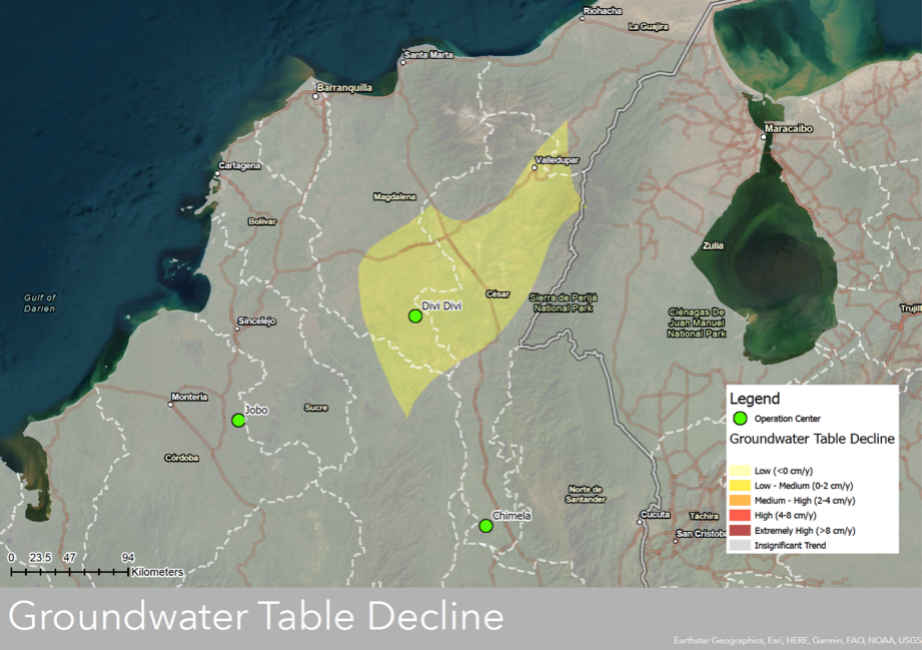Water Management
Canacol recognizes water as an essential resource for sustainable development and environmental conservation. Its responsible management is a strategic priority within the Company’s operations.
To minimize environmental impact, ensure efficient use, and contribute to the preservation of water sources, Canacol implements strategies focused on monitoring, reduction, and reuse. These include the establishment of water supply baselines prior to the start of any project, enabling optimization of industrial processes and promoting responsible water use.
In addition, Canacol fosters environmental awareness through training programs aimed at employees, contractors, communities, and strategic partners. This comprehensive approach ensures compliance with current regulations and reinforces the Company’s long-term commitment to sustainability.
Water-Related Incidents
We take pride in reporting that Canacol has upheld an unblemished track record concerning water-related incidents. Our dedication to responsible management has enabled us to effectively safeguard this vital resource, preventing any incidents that could affect its quality or availability. We remain committed to upholding this exceptional track record, reaffirming our commitment to the protection and preservation of water throughout all our operations and activities.
For further information regarding water management, please refer to the ESG Report
Water Consumption in Areas of Water Stress
We systematically monitor and map water consumption within our operational region using a comprehensive water management tool that considers local water stress levels, using the World Resources Institute's Water Risk Atlas. Collaborating with the Colombian Institute of Hydrogeology, Meteorology and Environmental Studies (IDEAM), we have evaluated water stress levels at our work sites, thereby confirming that our operations occur in regions with minimal water stress.
- Water Stress Analysis: Our operational sites in the departments of Sucre and Córdoba (indicated by the green dots on the map), exhibit no decline or only a low level of decline in groundwater levels (as in VIM-33).
- Analysis of Water Stress/Global Water Risk: The departments of Córdoba and Sucre, where our operations are located (marked with green dots), are classified as a low-medium water risk.
Water Management Policy
For further insights into water management, please refer to our ESG report
Water Risk Management Programs
Dependency-related water risks considered in risk Assessment: Canacol conducts hydrological and hydrogeological studies to assess the water potential in its areas of operation. Additionally, according to data from the World Resources Institute (WRI), our operations are not located in water-stressed areas. At Canacol, we implement water supply controls as established by the environmental license and develop water reuse activities to prevent conflicts related to this issue. It is important to mention that, since our operations are primarily focused on natural gas, they do not have excessive water requirements, allowing us to meet these needs without generating significant impacts.
Impact-related water risks considered in risk Assessment: For impact control, at Canacol we develop recirculation processes for water utilization, ensuring that there is no contamination of water sources. Additionally, we do not carry out any surface water extraction or discharges, thus preventing the contamination of water bodies. The Company's risk assessments indicate that this risk is low and remains controlled due to frequent reviews by the environmental authority, which includes a piezometric monitoring network for the water reinjection processes.
Assessment of impacts on local stakeholders: According to the hydrological and hydrogeological studies that have been conducted, as well as the historical water demand data from the operation, we can determine that our operations have not affected the availability of the resource for the various stakeholders involved in the project. Similarly, to avoid increasing the demand from the operation, we have established goals to limit water consumption, implemented license controls that restrict the amount of water we can extract, and conduct ongoing monitoring of water sources to ensure that we do not affect the quality of the existing resource, which is shared with the communities in the area of interest.
Assessment of future potential regulatory changes at a local level: At Canacol, we periodically conduct follow-up analyses of water regulations in collaboration with environmental authorities at the local and national levels.
Water Management Goals
Comprehensive water resource management across Canacol’s operations not only creates value by optimizing production and securing reserves but also ensures the availability and sustainability of water supply in both the short and long term for projects and activities. For this reason, the Company has set specific water management goals, structured across different time horizons.
For more information on our water management strategy, please refer to the ESG Report
Water Risk Management and Sustainability Commitments
Water risk management has been a central pillar of Canacol’s environmental strategy, evolving toward a more efficient and sustainable approach. Since 2021, the Company has suspended surface water intake, prioritizing supply through groundwater sources and authorized third-party providers. This measure not only reduces pressure on sensitive ecosystems but also strengthens operational resilience in the face of extreme weather events.
In line with its Sustainability Policy, Canacol has optimized industrial water monitoring and consumption processes, incorporating advanced analyses of resource availability and seasonality. As part of this commitment, new methodologies have been implemented to ensure responsible and efficient water use across all operational stages.
Additionally, the Company developed and published its TNFD report—a tool used to assess water stress, as well as the risks and opportunities associated with the watersheds within its areas of influence.


